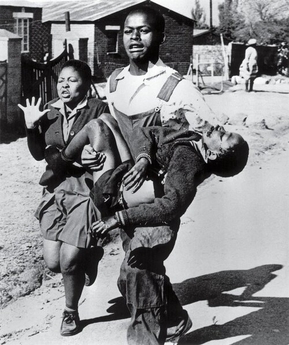 Sam Nzima's photo, above, of Mabuyisa Makhubo carrying the body of twelve-year old Hector Pieterson as his sister Antoinette Sithole weeps beside them, is the most iconic image of the Soweto uprisings.
Sam Nzima's photo, above, of Mabuyisa Makhubo carrying the body of twelve-year old Hector Pieterson as his sister Antoinette Sithole weeps beside them, is the most iconic image of the Soweto uprisings.Tomorrow, June 16, is a South African public holiday to commemorate the students who participated in the Soweto Uprising in 1976. They were protesting a recently-enforced government requirement that instruction take place in Afrikaans. The Bantu Education System, installed under Apartheid, intentionally provided an unequal education to blacks and prepared them for lower-tier jobs in the homelands or laboring for a white grootbaas ("big boss" in Afrikaans). Following an economic recession in 1975, the Apartheid government was spending R644 per white student and R42 per black student. That year, it was announced that half of all instruction would be taught in Afrikaans (the other half was to be in English), despite the fact that many students and teachers did not speak the language. Afrikaans was also considered the language of the oppressor.
Students were increasingly politicized following the foundation of the African Students' Movement in 1968, which became the South African Students' Movement (SASM) in 1972, and students in Soweto, a township in Johannesburg, organized to boycott and march on June 16, 1976, in protest of the Afrikaans requirement. The South African police barricaded the students' marching route and ordered them to disperse, throwing tear gas canisters. The students refused, and police then began shooting into the crowd. In the riots and chaos that ensued, anywhere from 200-500 were killed (or more...the record isn't clear), buildings associated with the Apartheid government were burned and otherwise defaced, and riots spread across the country. Students from the white University of Witwatersrand in Johannesburg marched to protest the government's killing of children. The Soweto Uprising was one of the watershed moments of the anti-Apartheid struggle, cemented the role of students in the fight for freedom, and put further international pressure on the Apartheid government. It's pretty amazing, when you think about it, that a bunch of children were able to influence the course of history and willing to put their bodies in the way to stop an oppressive regime.
Students were increasingly politicized following the foundation of the African Students' Movement in 1968, which became the South African Students' Movement (SASM) in 1972, and students in Soweto, a township in Johannesburg, organized to boycott and march on June 16, 1976, in protest of the Afrikaans requirement. The South African police barricaded the students' marching route and ordered them to disperse, throwing tear gas canisters. The students refused, and police then began shooting into the crowd. In the riots and chaos that ensued, anywhere from 200-500 were killed (or more...the record isn't clear), buildings associated with the Apartheid government were burned and otherwise defaced, and riots spread across the country. Students from the white University of Witwatersrand in Johannesburg marched to protest the government's killing of children. The Soweto Uprising was one of the watershed moments of the anti-Apartheid struggle, cemented the role of students in the fight for freedom, and put further international pressure on the Apartheid government. It's pretty amazing, when you think about it, that a bunch of children were able to influence the course of history and willing to put their bodies in the way to stop an oppressive regime.
More here.

No comments:
Post a Comment